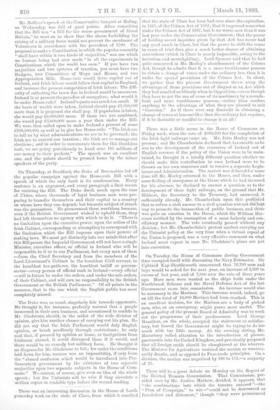On Thursday, at Bradford, the Duke of Devonshire led off
the popular campaign against the Home-rule Bill with a speech of which the only fault is its condensation. Every sentence is an argument, and every paragraph a final reason for resisting the Bill. The Duke dwelt much upon the case of Ulster, where thousands of loyal business men were pre- paring to transfer themselves and their capital to a country on whose laws they can depend; but his main subject of attack was the guarantees. He pronounced them worthless, because, even if the British Government wished to uphold them, they had left themselves no agency with which to do it. "There is no limitation upon the executive power, upon the action of the Irish Cabinet, corresponding or attempting to correspond with the limitation which the Bill imposes upon their powers of making laws. We must get distinctly into our minds that after this Bill passes the Imperial Government will not have a single Minister, executive officer, or official in Ireland who will be responsible to it or to our Parliament, but every man of them —from the Chief Secretary and from the members of the Lord-Lieutenant's Cabinet to the humblest Civil servant, to the humblest tax-gatherer, the humblest bailiff or process- server—every person of official rank in Ireland—every official —will in future be under the orders, and under the sole orders, of their Cabinet, and will own no responsibility to the British Government or the British Parliament." Of all points in the measure, that is the one which the English public has most completely missed.


































 Previous page
Previous page